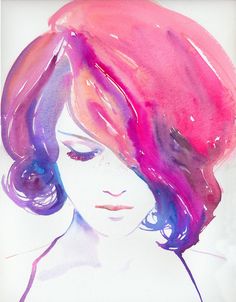Femininity is Not a Hair Length

When I was a senior in high school, I decided to chop all of my hair off. It was shoulder length, a weird texture combination of frizzy and wavy, and in sore need of some attention. I had dyed it every natural color under the sun, from blonde to black. I'd straightened it, permed it, and generally abused it. So off it went. When the hairstylist turned my chair around and I saw short-hair-me for the first time, I fell in love with pixie cuts. It was different. It was unique. It was...Chloe.
Short hair became my signature look. I started college that fall and there were barely any other girls with short hair. I stuck out and people remembered me pretty easily just based on my haircut. My personal style evolved and my hair played a role in the shaping of my personal style.
After we got engaged, I began to ponder what hair length I would want for the day of the wedding. The question was further mulled over after the question that I heard over and over was 'Are you growing your hair out for the wedding?' So I decided to try it. After all, it had been almost four years since I had seen myself with long hair. Things that I didn't like about it could have changed. Maybe the texture was different now. Maybe I was more patient in dealing with that awkward stage between looking like Justin Bieber and rocking an #throwbackthursday 1980's mullet. But as the months between haircuts stretched on and on, I quickly realized that I am still not patient. The more my hair inched along in growth, the more it didn't feel like 'me,' it didn't feel like a Chloe thing to do. I prayed about it, asked for opinions and began to think about it quite a bit more than I had originally. Verily Magazine author Gail Werner wrote, "Historically, hair length has aligned itself with society's notions of femininity. Consider the juxtaposition of the rebellious flapper bob of the 1920s with the more ladylike bouffant of the Gibson girl. Or how a pixie crop worn by Twiggy in the sixties was considered androgynous whereas the long hair and feathered bangs of the 1970s-era Farrah Fawcett was the epitome of sexiness." She's right - we've fallen into the trap of connoting long hair with attractiveness, sexiness, desirability.
I desired that desirability, that beauty. I was torn between wanting hair long enough that I could run my hand through it, but still loving how amazingly practical short hair is. With the wedding day approaching, I wanted to be seen as beautiful, feminine. But none of those things were found solely in the length of my hair. And when I came to that realization, I ran to the salon (okay, Great Clips. I'm in college, let's be real). The ladies there told me how much they had hoped I would keep my hair short for the wedding. Leave it to hairstylists to know what's on your mind. But more important than realizing that it's possible to have a pixie cut and still feel beautiful, I discovered that femininity is exponentially more than the length of one's hair or even physical appearance in general.
Saint Pope John Paul II wrote a letter to women, in which he said, "Yet how many women have been and continue to be valued more for their physical appearance than for their skill, their professionalism, their intellectual abilities, their deep sensitivity; in a word, the very dignity of their being!" We live in a modern era where beauty is the definition of success and desirability. But you are worth more than what you look like. You are a human being who inherently deserves dignity simply based on the fact that you are a child of God.
"It is thus my hope, dear sisters, that you will reflect carefully on what it means to speak of the "genius of women", not only in order to be able to see in this phrase a specific part of God's plan which needs to be accepted and appreciated, but also in order to let this genius be more fully expressed in the life of society as a whole, as well as in the life of the Church." (JPII)
Femininity is found in giving hearts and kind words. In sacrifice and thoughts. In Marian examples. In caring and living one's life fully for Christ. Yet our world sees those traits as weakness. The radical feminist movement has labeled virtue as old fashioned and patriarchal.
True femininity, not what one looks like or the clothes one wears, but true femininity is found in the concept of motherhood.
Alice Von Hildebrand wrote, "A woman by her very nature is maternal -- for every woman, whether married or unmarried, is called upon to be a biological, psychological or spiritual mother -- she knows intuitively that to give, to nurture, to care for others, to suffer with and for them -- for maternity implies suffering -- is infinitely more valuable in God's sight than to conquer nations and fly to the moon." Perhaps that's why the culture has reduced femininity to physical appearances. Hair length is much easier to perfect than an interior life most assuredly. Louisa May Alcott wrote, "Let us be elegant or die!" which accurately describes the fascination with the outward. Defy the culture...turn the focus inward, to the interior.
Motherhood (spiritual or physical) is sacrifice. It's joyful suffering for the good of the Heavenly family and the eternal life that we're working to. That virtuous, adventurous life is a lot harder to grow than a couple more inches of hair. And much more rewarding.
